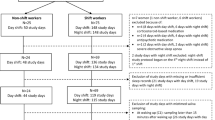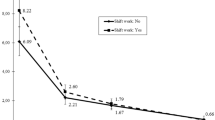Abstract
Purpose
This study aims at modelling the relationship between the number of work hours per week and cortisol variation across 3 days by comparing non-working day to working day in a population of day-shift workers.
Methods
Questionnaire data and saliva samples for cortisol analysis were collected on 132 day-shift workers employed in 13 workplaces in Canada. Consenting workers provided 5 saliva samples a day (awaking, 30 min after awaking, 2 p.m., 4 p.m., bedtime) repeated 3 times (Saturday, Tuesday, Thursday) over a week, to provide measures at work and non-work times and settings. Multilevel regression models were estimated from cortisol measurements at each occasion within a day at level-1, days at level-2 and workers at level-3.
Results
Controlling for gender and age, results revealed significant variations in salivary cortisol concentration between sample, day and worker levels. Cortisol increases linearly from non-working day to work days and work hours per week interacted with days, revealing a positive association between the number of work hours per week and cortisol concentrations during these days. Work hours per week did not interact with awaking, 30 min after awaking, 2 p.m., 4 p.m., and bedtime cortisol concentrations. Gender and age had neither main effects nor interaction effects. No significant cortisol variations were found between workplaces.
Conclusion
These results suggest that work hours act as a stressor that is associated with significant variations in cortisol concentrations over working days. Non-working days may contribute to stress reduction in workers who experience longer work hours.


Similar content being viewed by others
References
Anderson AK, Phelps EA (2001) Lesions of the human amygdala impair enhanced perception of emotionally salient events. Nat Neurosci 411:305–309
Chida Y, Steptoe A (2009) Cortisol awakening response and psychosocial factors: a systematic review and meta-analysis. Biol Psychol 80(3):265–278
Clow A, Thorn L, Evans P, Hucklebridge F (2004) The awakening cortisol response: methodological issues and significance. Stress 7(1):29–37
Connolly JD, Goodale MA, Menon RS, Munoz DP (2002) Human fMRI evidence for the neural correlates of preparatory set. Nat Neurosci 5:1345–1352
Dahlgren A, Kecklund G, Theorell T, Akerstedt T (2009) Day-to-day variation in saliva cortisol–relation with sleep, stress and self-rated health. Biol Psychol 82(2):149–155
Federenko I, Wust S, Hellhammer DH, Dechoux R, Kumsta R, Kirschbaum C (2004) Free cortisol awakening responses are influenced by awakening time. Psychoneuroendocrinology 29(2):174–184
Garde AH, Faber A, Persson R, Hansen AM, Hjortskov N, Orbaek P, Schibye B (2007) Concentrations of cortisol, testosterone and glycosylated haemoglobin (HbA1c) among construction workers with 12-h workdays and extended workweeks. Int Arch Occup Environ Health 80(5):404–411
Goldstein H (1986) Multilevel mixed linear model analysis using iterative generalized least square. Biometrika 73:43–56
Goldstein H (1995) Multilevel statistical models. Edward Arnold. Halstead Press, London, NY
Junghanns K, Backhaus J, Tietz U, Lange W, Bernzen J, Wetterling T, Rink L, Driessen M (2003) Impaired serum cortisol stress response is a predictor of early relapse. Alcohol Alcohol 38(2):189–193
Kiefer F, Jahn H, Otte C, Naber D, Wiedemann K (2006) Hypothalamic-pituitary-adrenocortical axis activity: a target of pharmacological anticraving treatment? Biol Psychiatry 60(1):74–76
Kunz-Ebrecht SR, Kirschbaum C, Marmot M, Steptoe A (2004) Differences in cortisol awakening response on work days and weekends in women and men from the Whitehall II cohort. Psychoneuroendocrinology 29(4):516–528
Lupien SJ, Lecours AR, Lussier I, Schwartz G, Nair NP, Meaney MJ (1994) Basal cortisol levels and cognitive deficits in human aging. J Neurosci 14:2893–2903
Lupien SJ, de Leon M, de Santi S, Convit A, Tarshish C, Nair NP, Thakur M, McEwen BS, Hauger RL, Meaney MJ (1998) Cortisol levels during human aging predict hippocampal atrophy and memory deficits. Nat Neurosci 1(1):69–73
Lupien SJ, Gillin CJ, Hauger RL (1999) Working memory is more sensitive than declarative memory to the acute effects of corticosteroids: a dose-response study in humans. Behav Neurosci 113(3):420–430
Lupien SJ, Wilkinson CW, Briere S, Menard C, Ng Ying Kin NM, Nair NP (2002a) The modulatory effects of corticosteroids on cognition: studies in young human populations. Psychoneuroendocrinology 27(3):401–416
Lupien SJ, Wilkinson CW, Briere S, Ng Ying Kin NM, Meaney MJ, Nair NP (2002b) Acute modulation of aged human memory by pharmacological manipulation of glucocorticoids. J Clin Endocrinol Metab 87(8):3798–3807
Maheu FS, Joober R, Beaulieu S, Lupien SJ (2004) Differential effects of adrenergic and corticosteroid hormonal systems on human short- and long-term declarative memory for emotionally arousing material. Behav Neurosci 118(2):420–428
Maina G, Palmas A, Filon FL (2008) Relationship between self-reported mental stressors at the workplace and salivary cortisol. Int Arch Occup Environ Health 81(4):391–400
Ng TWH, Feldman DC (2008) Long work hours: a social identity perspective on meta-analysis data. J Organ Behav 29:853–880
Olive MF, Mehmert KK, Koenig HN, Camarini R, Kim JA, Nannini MA, Ou CJ, Hodge CW (2003) A role for corticotropin releasing factor (CRF) in ethanol consumption, sensitivity, and reward as revealed by CRF-deficient mice. Psychopharmacology 165(2):181–187
Owen AM, Doyon J, Petrides M, Evans AC (1996) Planning and spatial working memory: a positron emission tomography study in humans. Eur J Neurosci 8:353–364
Persson R, Orbaek P, Ursin H, Kecklund G, Osterberg K, Akerstedt T (2003) Effects of the implementation of an 84-h workweek on neurobehavioral test performance and cortisol responsiveness during testing. Scand J Work Environ Health 29(4):261–269
Pruessner JC, Wolf OT, Hellhammer DH, Buske-Kirschbaum A, von Auer K, Jobst S, Kaspers F, Kirschbaum C (1997) Free cortisol levels after awakening: a reliable biological marker for the assessment of adrenocortical activity. Life Sci 61(26):2539–2549
Pruessner JC, Hellhammer DH, Kirschbaum C (1999) Burnout, perceived stress, and cortisol responses to awakening. Psychosom Med 61(2):197–204
Pruessner M, Hellhammer DH, Pruessner JC, Lupien SJ (2003) Self-reported depressive symptoms and stress levels in healthy young men: associations with the cortisol response to awakening. Psychosom Med 65(1):92–99
Rasbash J, Steele F, Browne W, Goldstein H (2009) A user’s guide to MLwiN version 2.10. Centre for multilevel modelling. University of Bristol, Bristol
Raudenbush SW, Bryk AS (2002) Hierarchical linear models: applications and data analysis methods. Sage Publications Inc., Thousand Oaks
Sachar EJ, Hellman L, Roffwarg HP, Halpern FS, Fukushima DK, Gallagher TF (1973) Disrupted 24-h patterns of cortisol secretion in psychotic depression. Arch Gen Psychiatry 28:19–24
Schlotz W, Hellhammer J, Schulz P, Stone AA (2004) Perceived work overload and chronic worrying predict weekend-weekday differences in the cortisol awakening response. Psychosom Med 66(2):207–214
Sillaber I, Rammes G, Zimmermann S, Mahal B, Zieglgansberger W, Wurst W, Holsboer F, Spanagel R (2002) Enhanced and delayed stress-induced alcohol drinking in mice lacking functional CRH1 receptors. Science 296:931–933
Sluiter JK, van der Beek AJ, Frings-Dresen MH (1998) Work stress and recovery measured by urinary catecholamines and cortisol excretion in long distance coach drivers. Occup Environ Med 55(6):407–413
Sluiter JK, Frings-Dresen MH, Meijman TF, van der Beek AJ (2000a) Reactivity and recovery from different types of work measured by catecholamines and cortisol: a systematic literature overview. Occup Environ Med 57(5):298–315
Sluiter JK, Frings-Dresen MH, van der Beek AJ, Meijman TF, Heisterkamp SH (2000b) Neuroendocrine reactivity and recovery from work with different physical and mental demands. Scand J Work Environ Health 26(4):306–316
Smyth KA, Ferris SH, Fox P, Heyman A, Holmes D, Morris JN, Phillips CD, Schulz R, Teresi J, Whitehouse PJ (1997) Measurement choices in multi-site studies of outcomes in dementia. Alzheimer Dis Assoc Disord 11(Suppl 6):30–44
Snijders TAB, Bosker RJ (1999) Multilevel analysis. An introduction to basic and advanced multilevel modeling. Sage Publications, London
Spurgeon A, Harrington MJ, Cooper CL (1997) Health and safety problems associated with long working hours: a review of the current position. Occup Environ Med 54:367–375
Steptoe A, Siegrist J, Kirschbaum C, Marmot M (2004) Effort-reward imbalance, overcommitment, and measures of cortisol and blood pressure over the working day. Psychosom Med 66(3):323–329
Stone AA, Schwartz JE, Smyth J, Kirschbaum C, Cohen S, Hellhammer D, Grossman S (2001) Individual differences in the diurnal cycle of salivary free cortisol: a replication of flattened cycles for some individuals. Psychoneuroendocrinology 26(3):295–306
Thomas C, Hertzman C, Power C (2009) Night work, long working hours, psychosocial work stress and cortisol secretion in mid-life: evidence from a British birth cohort. Occup Environ Med 66(12):824–831
Tulving E (2002) Episodic memory: from mind to brain. Annu Rev Psychol 53:1–25
van der Hulst M (2003) Long hours and health. Scand J Work Environ Health 29(3):171–188
van Eck M, Berkhof H, Nicolson N, Sulon J (1996) The effects of perceived stress, traits, mood states, and stressful daily events on salivary cortisol. Psychosom Med 58(5):447–458
van Holland BJ, Frings-Dresen MH, Sluiter JK (2011) Measuring short-term and long-term physiological stress effects by cortisol reactivity in saliva and hair. Int Arch Occup Environ Health. doi:10.1007/s00420-011-0727-3
Acknowledgments
This study was supported by the Canadian Health Research Institutes and the Fonds de la recherche en santé du Québec. The authors also thank Standard Life Canada for their help in workplace recruitment.
Conflict of interest
The authors declare that they have no conflict of interest.
Author information
Authors and Affiliations
Corresponding author
Rights and permissions
About this article
Cite this article
Marchand, A., Durand, P. & Lupien, S. Work hours and cortisol variation from non-working to working days. Int Arch Occup Environ Health 86, 553–559 (2013). https://doi.org/10.1007/s00420-012-0788-y
Received:
Accepted:
Published:
Issue Date:
DOI: https://doi.org/10.1007/s00420-012-0788-y




